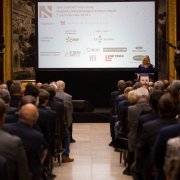Piotr Śniady, Wiesław Babik and Michał Bilewicz became the awardees of the 2015 National Science Centre (NCN) Award. Each will receive ca. EUR 12 000 for their respective outstanding research achievements.

Winners of the 2015 NCN Award. From left to right: dr hab. Michał Bilewicz, prof. dr hab. Piotr Śniady and dr hab. Wiesław Babik. Photo: Michał Niewdana
The winners were chosen from amongst researchers under 40 years old as the idea of the Award is to support young researchers. It is conferred for notable achievements in basic research carried out in a Polish research institution. The Award has been funded by enterprises committed to supporting research.
The 2015 winner in Arts, Humanities and Social Sciences is dr hab. Michał Bilewicz, a social psychologist at the Faculty of Psychology, the University of Warsaw, for demonstrating the trifactorial structure of today’s anti-Semitism and its psychological consequences.
Prejudices lead to discrimination, conflicts and sometimes even to crimes and genocide. I decided to study these prejudices to better understand and be able to explain the dark side of the human psyche. By learning more about sources of prejudices we can be more successful in our efforts to prevent them – and I hope my research will prove useful in this particular field, said dr Michał Bilewicz.
The Award in Arts, Humanities and Social Sciences was funded by FBN Poland: Colian, ENEL-MED SA, Grupa Bemo Motors, Nowy Styl, Netbox PL Sp. z o.o. and Yes.
This year’s winner in Life Sciences is dr hab. Wiesław Babik, an evolutionary biologist at the Institute of Environmental Sciences, Jagiellonian University. The chapter of the Award has singled him out for his research on adaptive evolution in animals, with particular focus on the MHC genetic variability.
I am interested in the use of historical information stored in DNA for making conclusions on evolutionary processes. Such research helps us better understand the mechanisms thanks to which the enormous number of creatures inhabiting the Earth have come into the world.
The Award in the category of Life Sciences was funded by Celon Pharma S.A.
This year’s third laureate of the NCN Award is professor dr hab. Piotr Śniady who works at the Faculty of Mathematics and Computer Science, Adam Mickiewicz University, and the Polish Academy of Sciences. His significant results in the Physical Sciences and Engineering deal with the calculus of probability.
The aim of my investigations is to find hidden structures that could explain the shape of our physical world as well as the invisible one of mathematical ideas. The tools offered to us by combinatorics seem particularly well-suited for the task, said professor Śniady.
The Award in Physical Sciences and Engineering was funded by EDF Polska S.A.
The National Science Centre Award in three domains is conferred by the NCN Council and a special chapter, composed of the representatives of the Centre as well as the sponsors of the Award. Candidates can be nominated by other eminent researchers, with each researcher recommending only one candidate.
There were 72 entries with several nominees named more than once. Of the entries sent, the competition committees of the NCN Council chose two finalists for each of the three research domains. The final selection had been concluded by the chapter already back in September, but the laureates’ names were kept secret until the evening of the ceremony.
The award ceremony was held on 7th October at a Gallery of 19th-Century Polish Art in the Cloth Call (a branch of the National Museum in Krakow). It was hosted by Grażyna Torbicka, and the winners received their laurels from the hands of the secretary at the Ministry of Science and Higher Education, professor Maciej Ratajczak; director of the NCN, professor Zbigniew Błocki; the chair of the NCN Council, Michał Karoński, and representatives of the Award’s funding partners: Jerzy Chachuła, R&D director of EDF Polska S.A.; Bogdan Manowski, member of the board at Celon Pharma S.A., and Adam Rozwadowski, board director at the ENEL-MED S.A.
Photos by Michał Niewdana
















